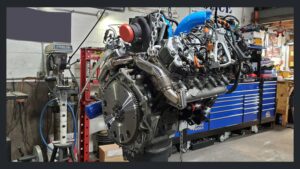
How does a diesel engine work?
When we think of diesel engines, we often think of semi-trucks delivering goods to stores or large pickup trucks towing flatbeds and horse trailers.
One of the biggest advantages of diesel engines is their low fuel consumption. Since truck drivers are on the road most of the day, it is more economical to drive a diesel vehicle than a gasoline vehicle. Diesel engines use less fuel because they run at slower speeds. Diesel engines don’t need that ignition spark.
Four-stroke diesel engines
There are two types of diesel engines: four-stroke and two-stroke. His inventor was Rudolf Diesel, who invented a process called the “Diesel cycle”. This cycle is based on a higher compression ratio of air.
The heat generated by this compressed air can reach temperatures of 390°C to 710°C. Sometimes the temperature can be even higher. Below is the 4 stroke of a diesel engine.
Stroke #1
The first cycle of the diesel cycle is virtually the same as the gasoline cycle. The inlet valve opens and outside air flows in. The lower cylinder receives this air through the downward movement of the piston, drawing air into the cylinder.
Stroke #2
The second subscript contains compression. After the intake valve closes, the air is compressed as the piston rises. There is a small, limited space in this area that allows for higher compression.
Stroke #3
Combustion takes place in the third cycle. As the air becomes highly compressed, it starts to heat up significantly. The injectors then inject diesel fuel into the combustion chamber, which now contains all that hot compressed air. As soon as the fuel comes into contact with the compressed air, it ignites. This ignition creates heat energy, which in turn creates the power needed to move the vehicle.
Stroke #4
The fourth stroke is concerned with exhaust. All the exhaust gases generated are pushed out by the piston through the open exhaust valve. This creates the infamous black smoke that diesel vehicles are known for. This smoke comes from the exhaust pipe (of the semi-trailer).
Conclusion
The same thing applies here. With a diesel engine, you don’t have to worry about spark plugs. That might be one less maintenance thing you have to worry about. This will help you get the most out of your diesel engine’s lifespan.

